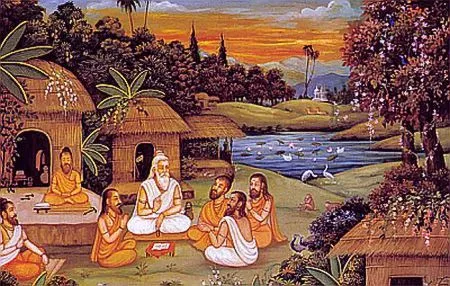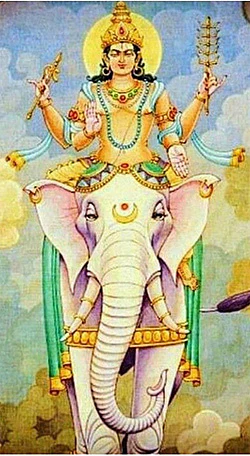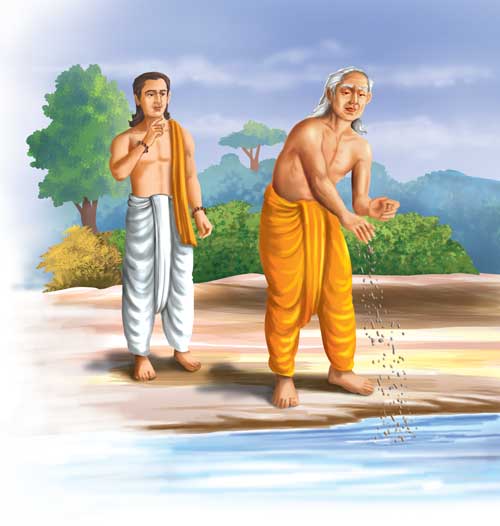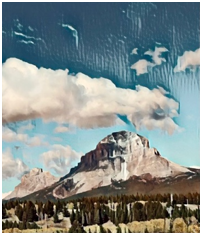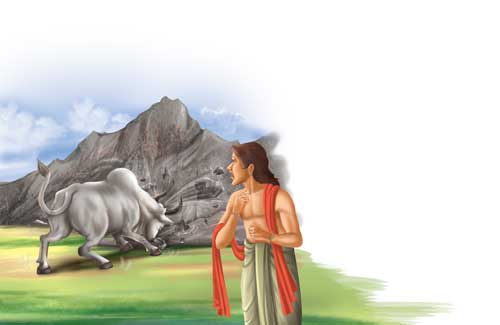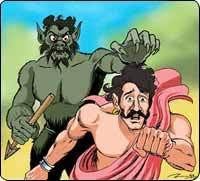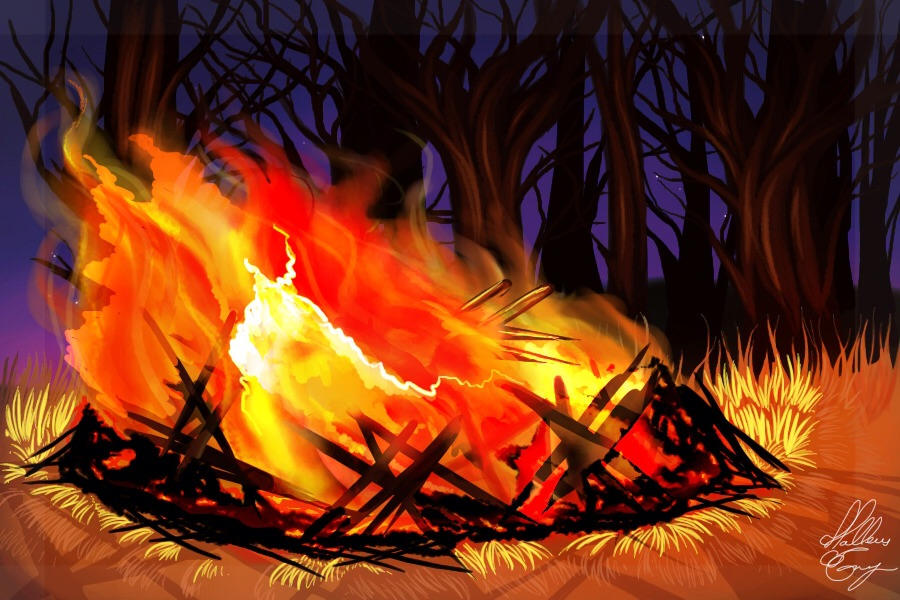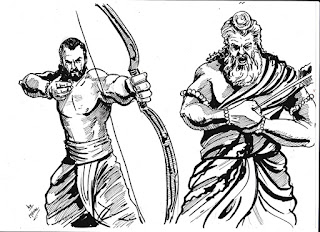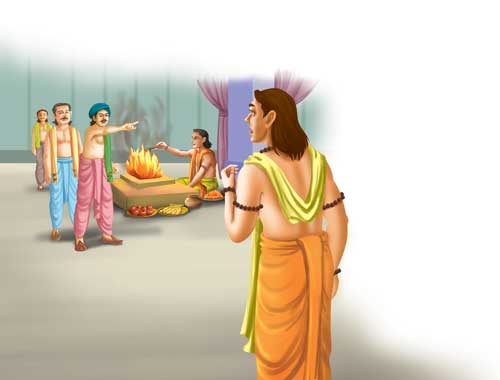By Nirooshitha Sethuram, Yogaratna
Graphics by Sheralee (Shambhavi) Hancherow
Sage Lomasa and the Pandavas reached the hermitage of Sage Raibhya on the banks of the Ganga. Sage Lomasa told them about the sanctity of this holy place. Then he started to recite the story of two sages, Bharadvaja and Raibhya who were dear friends.
Raibhya had two sons named Paravasu and Arvavasu. They became scholars in Vedas just like their father and were respected by all, along with their father. This made Bharadvaja’s only son, Yavakrida jealous. He wished to gain knowledge of the scriptures quickly without seeking a teacher.
Instead of learning for years, he chose a shortcut — to please Indra, the Lord of the Devas, asking him for direct knowledge of the Vedas. So he did intense penance and austerities to achieve this.
Indra appeared in front of him and advised that austerities are not the way to gain knowledge. The path to acquire knowledge is to study the scriptures under the guidance of a teacher.
Yavakrida, however, didn’t yield. He refused to take Indra’s advice, went on and pursued more austerities, with even greater means, to please Indra. Indra appeared again and warned him that the path he was taking to seek knowledge was not the right path, saying that one can acquire knowledge only by studying. He then reminded Yavakrida that his own father Bharadvaja gained knowledge by studying patiently. Yavakrida refused to accept this answer again and threatened to cut off his own limbs and offer them to the sacred fire. He wouldn’t give up on his penance.
Continuing his severe penance, one day when he went for a bath, he saw an old man strenuously throwing handfuls of sand from the bank into the river Ganga. Yavakrida was puzzled by his action and asked what he was trying to accomplish. The old man replied, saying he was building a bridge across the river so people could easily cross.
Yavakrida yelled at him, saying how foolish he was to accomplish his task in this ridiculous manner. The old brahmin said, “It is no crazier than learning the scriptures through austerities instead of studying under a teacher.”
Yavakrida recognized that the old man was none other than Indra himself, and asked for his blessings. Indra at last blessed Yavakrida with knowledge of the Vedas, but with a lot of reluctance. Yavakrida became very proud to have learned Vedas directly from Indra instead of through conventional learning.
After becoming a scholar in the Vedas, Yavakrida grew an attitude. He was thinking that he had acquired the knowledge of the Vedas through the boon of Indra instead of through a human, thus making him special. His father warned him against his pride. But Yavakrida was too proud to listen.
He started to disrespect Raibhya very much. Bharadvaja feared that his son might ruin himself by this attitude, so he decided to advise him by telling him an ancient story.
There once lived a sage named Baladhi. His son’s untimely death plunged him into grief. He decided to do severe penance in order to get a son who would be deathless. He spent years on rigorous penance, needed because he was asking for immortality,. However, he realized that attaining immortality is not possible, so he was motivated to ask for a different boon.
Seeing a mighty mountain in front of him. Baladhi asked for a son with a life that will persist as long as the mountain in front of him lasts. So, the sage was blessed with a son named Medhavi. He grew up with an arrogance, thinking that he was safe from death forever, as he would live as long as the mountain existed.
He angered a great sage by disrespecting him in an unwarranted manner. The angry sage cursed Medhavi that he would turn into ashes, but the curse didn’t work on him. Medhavi remained in perfect health. The sage then realized that Medhavi had protection from the boon that he had received, to live as long as the mountain existed.
So, the sage took the form of a wild buffalo. By the power of his own penance, he crashed the mountain and broke it into pieces. That ended Medhavi’s life. After reciting the story, Bharadvaja concluded, telling his son to learn wisdom from this old story and not to be ruined by pride. Bharadvaja urged Yavakrida to cultivate self-restraint, and not to disobey the limits of good conduct, and to be respectful to the great Sage Raibhya.
One day Paravasu’s wife was alone in the garden of the hermitage of Raibhya. Yavakrida happened to see her. She was so beautiful and attractive that Yavakrida felt an irresistible desire to have her. Totally losing his self-control, overcome by lust, he dragged her to a lonely place and violated her person, committing the most dishonorable sin.
Raibhya came to know about his daughter-in-law. He was enraged about the manner she was disgraced by Yavakrida. He had no words to console his daughter-in-law. With his yogic power from his sacrificial fire, he raised a maiden as beautiful as his own daughter-in-law, along with a terrible demon. He commanded them to kill Yavakrida.
The maiden tempted Yavakrida with her charms while he was performing a ritual. When Yavakrida was distracted, she ran away with his kamandala, the water jug he was using for his rituals. The demon jumped at Yavakrida with a spear in his hand. Terrified, Yavakrida ran after the maiden to recover his kamandala, knowing that his mantras would be powerless until he cleansed himself with water.
Unable to catch her, to save himself from the demon, he rushed to a pond for water but unfortunately the pond was dry. Then he ran to a nearby stream which also dried up as he approached it. There was no water for him anywhere. Together the maiden and the demon accomplished their task. Yavakrida was killed at the entrance to his father’s hermitage.
Bharadvaja was very much distressed about his son’s death. In grief, he cursed his dear friend Raibhya for killing his only son. Regaining control of himself soon after, he yelled, “They alone are blessed who have no sons. I have not only lost my only son, but in the foolishness of my grief, I have also cursed my dear friend. What is the use of continuing my life?” He cremated his son’s body and then threw himself into the same funeral pyre.
After some time, Raibhya’s sons Paravasu and Arvavasu were invited to the palace of King Brihadyumna to perform a great yajňa and sacrifice. While arrangements were being made for the yajňa, Paravasu desired to go and see his wife, walking alone all night. Near the ashram he saw in the twilight something moving, which seemed to him like a wild beast and therefore shot it down with an arrow.
It turned out that Paravasu had killed his own father, Raibhya, who was dressed in tree bark, mistaking him for a wild beast. He realized that the fatal mistake happened as a result of Bharadvaja’s curse. He returned to the yajňa and told his brother Arvavasu what had transpired.
Arvavasu consoled his brother and asked him to continue to perform the yajňa and said that he will go and perform their father’s last rites. He also said that he will do the penance on behalf of his brother freeing him from the terrible sin of killing their father. After finishing his penance on behalf of his brother, Arvavasu returned to the court of the king to join his brother and assist in the yajňa.
Seeing the radiance on his brother’s face, Paravasu became jealous and told everyone that Arvavasu had killed their father. Arvavasu tried to deny his brother’s accusation, but none believed him. Arvavasu was expelled from the yajňa hall by the order of the king. Being not only learned but also virtuous, he retreated to the forest with a heavy heart.
To find justice in the world, in despair, he immersed himself in rigorous penance. Soon the Gods appeared and asked him what boon he sought. Arvavasu asked to free his heart of all anger at his brother’s misconduct and to bring his father to life again. In this way, his brother’s sins would be washed off and he would be freed from his wickedness. The Gods fulfilled all his wishes.
Sage Lomasa thus finished the story, advising the Pandavas to take a bath in the holy river Ganga nearby, to purify themselves. He later emphasized the teaching in the story, “Learning is no protection against vanity or lust. A wise man should never lose his self-control. Many acquire knowledge and fame, only to lose self-control. They fall prey to lust and ruin themselves.”
He continued saying, “Learning is one thing and virtue is quite another. It is true that one should know the difference between good and evil, if one is to seek good and shun evil. But this knowledge should soak into every thought and influence every action in one’s life. Then indeed knowledge becomes virtue. The knowledge that is undigested information, merely crammed into the mind, cannot instill virtue. It is just an outward show, like our clothes and it is not really part of us.”
More to come…
- Hermitage (Ashram) – https://hindupad.com/ashram
- Indra – https://pujayagna.com/blogs/hindu-gods-goddesses/lord-indra
- Yavakrida & Old Man (Indra) – https://www.sawanonlinebookstore.com/yavakridas-learning
- Mountain – Digital Image by S. Hancherow
- Wild Buffalo (Sage) & Medhavi – https://www.sawanonlinebookstore.com/medhavis-pride
- Demon & Yavakrida – https://www.sawanonlinebookstore.com/medhavis-pride
- Funeral pyre – https://www.deviantart.com/upb/art/Pyre-556253108
- Paravasu kills Raibhya – http://netra-creative-vision.blogspot.com/2018/03
- Paravasu accuses Arvavasu – https://www.sawanonlinebookstore.com/raibhyas-sons

